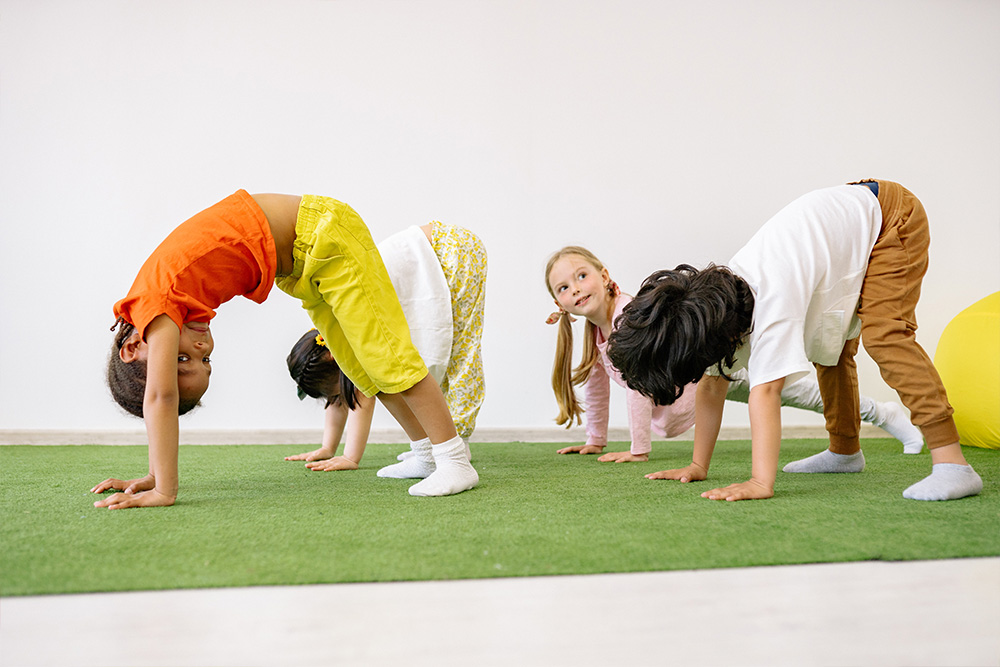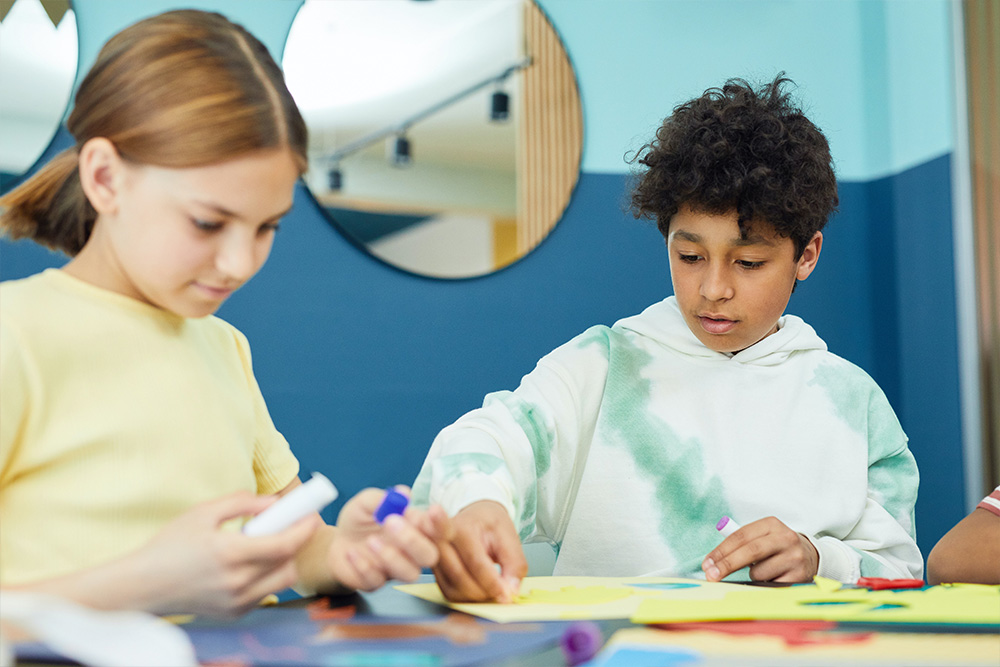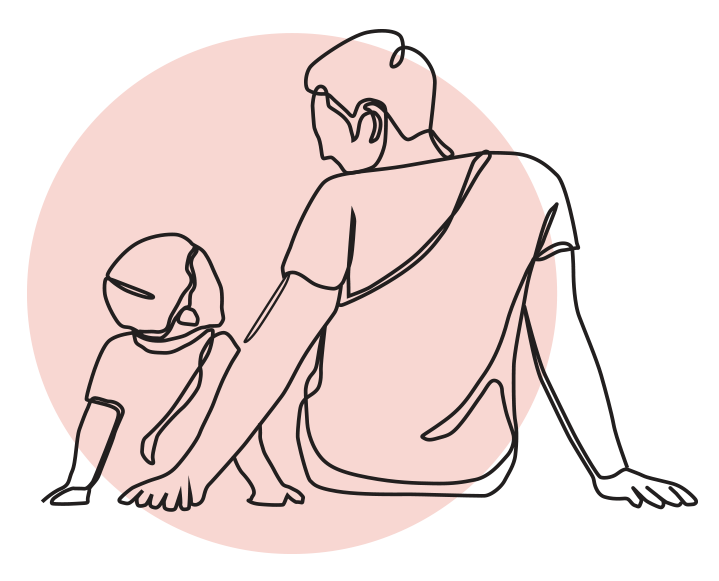With about 15% of the global population thought to be neurodivergent, it’s no surprise that huge numbers of parents are seeking diagnosis or looking for the best way to support their child’s unique way of being in the world. Here we focus on young children with ADHD with tips for supporting healthy behaviours from an early age.
ADHD is genetic so it often runs in families. People with ADHD have 3 main symptoms: attention problems, hyperactivity and impulsiveness. The ‘H’ for hyperactivity could refer to mental or physical hyperactivity with a whirring mind and/or a body like a little ‘motor’. A more romantic metaphor for a young child with ADHD is a butterfly, flitting from one flower to the next, never settling for more than a moment. There is so much to celebrate about children with this kind of curiosity and energy but there’s no denying there are real challenges for the child and for parents too. Because children with ADHD do require more ‘parenting’.

What is Going on in the Brain of Someone with ADHD?
Research has indicated that a neurotransmitter (brain messenger) called dopamine is a likely contributor to issues experienced by people with ADHD (among other factors). Broadly speaking it is thought that the dopamine transporters in people with ADHD do not work as required. Dopamine helps you regulate emotions, take action for a specific outcome, pay attention and make decisions. It is also involved with pleasure and a feeling of reward.
Children with ADHD often appear to be searching for something new to interest them, finding it hard to settle for one activity, particularly the one the adult intends! This is sometimes described as stimulation seeking. Young children might climb everywhere with their hands in every cupboard whilst older children could be described as ‘thrill-seeking’ or fascinated by everything except the task they really ‘need’ to complete. Boring, repetitive tasks can be deeply uncomfortable for some children (and adults) with ADHD.
As a parent one of our least fun but very important roles is teaching our children basic life skills so it can be incredibly frustrating when our children are busy avoiding any direction from us. It’s useful to consider that rather than being difficult, they may be trying to self-regulate, seeking a ‘dopamine hit’ that neurotypical children are already getting from the satisfaction of completing everyday tasks. Children with ADHD do need more rewards from us to keep them topped up (praise is one such reward) and this constant search for something new and interesting to do is often an attempt to get what they need from their environment, rather than defiance or naughtiness. Get in touch to talk to a trained professional for advice on helping your child(ren) with neurodiversity.
Struggling with impulse control is particularly hard to manage as children progress past the toddler years because your child may shout, hit or kick others when their peers have already learned to manage these behaviours. For the child it often leads to more negative feedback from adults and rejection by their friends which can lead to shame and low self-esteem. This is an area we can really help with as parents. Read our blog about parenting strategies to support the behaviour of children with ADHD, including adolescents and older children.
ADHD is absolutely not caused by parenting or diet but supporting healthy lifestyles (such as exercise and diet) is particularly important for children with ADHD and some evidence suggests that it can help to manage symptoms. Sleep, food and exercise are all directly related to focus and attention (in anyone), so they are a good place to start. Children with ADHD can be night-owls, with statistically higher rates of sleep disorders. Young children often struggle with getting tired at bedtime which is a problem because we know that better sleep improves concentration and impulse control. In fact, the more tired they get, the more wired they can get which often leads to frayed tempers and stressful evenings. It can feel like they are doing everything in their power to distract themselves from rest when it’s what they really need. So how can we help?

Promote Healthy Sleep Patterns
Many studies have shown that the slightly counter-intuitive way of helping your child is to move their bedtime earlier. This will mean they are less wired when you start trying to put them to sleep and specifically you will be putting them to bed at the natural point when melatonin kicks in. Screens reduce natural melatonin, so it’s recommended to stop screens at least an hour before their desired sleep time.
Lower lighting and less stimulating activities help as does having a bedroom that is not bursting with stimulating toys and chaos. All those distractable things to grab and throw are not helping your ball of energy prepare for sleep. Having a consistent bath, bed-time routine is key. Children with ADHD usually need help to self-regulate in the moment so that they can get on track and do what’s required so we need to be a calm, soothing presence (often against the odds!) as night-time comes. If not, things can easily spiral.

Food to Encourage & Avoid
Many ADHD diets recommend avoiding additives, food colourings, and preservatives. However, currently, there isn’t strong evidence to suggest eliminating food colourings has a significant effect on ADHD. Avoiding or limiting added sugars may well help to manage ADHD symptoms, as sugar may temporarily increase overactivity. You might consider speaking to a nutritionist to find the best diet for your child with their particular needs. If you are interested in learning more about diet and neurodiversity, we can recommend “Brain Brilliance: 60 Nourishing Recipes And A Nutritional Toolkit For Dyslexia, Dyspraxia, ADHD, Autism and All Neurodivergent Kids” by Lucinda Miller.
As a first step, you can’t go wrong by eating and avoiding the food listed below promoting overall brain health:
Avoid
- sugar and syrups, sweets
- sweetened breakfast cereals
- cookies, cakes, and pastries
- processed foods, such as snack foods and potato chips
Encourage
- Vegetables
- Fruits
- Sources of protein, such as eggs, milk, lean meat, nuts, soy, and low-fat yogurt
- Healthy fats, such as fatty fish, avocado, chia seeds, flaxseed, and tofu
- Complex carbohydrates such as beans, lentils, peas, brown rice, oatmeal, and whole grains
- Sources of vitamin B, such as leafy greens, broccoli, and chickpeas
- Sources of zinc, iron, and magnesium, such as poultry, seafood, meat, nuts, and soy
- Omega-3 fatty acids such as in salmon, walnuts, and edamame

The Importance of Exercise
Young children with ADHD often move around more, in fact sometimes it feels like they never stop. However, as they get older, they can become less active than other children which can increase risk of weight management issues. Some children might be less active because of hyper focus on screens or crafts/lego which stop them moving. If they do get hooked on screens it can become a real problem over time so it’s a good idea to set clear boundaries around screentime from a young age. Screens are particularly rewarding for a child who is looking for constant hits of dopamine like a child with ADHD. They are seeking stimulation at a quicker rate than your average child so the dopamine fix screens offer might be harder for them to resist.
One thing about exercise, which is true for everyone but particularly helpful for those with ADHD, is that you can focus better, and your mood is better in the period just afterwards. Exercise throughout the day will not only enable your child to have frequent bursts of focus but it helps the brain grow new neurons and learn faster. Evidence shows that 60mins of exercise a day at least is associated with healthier outcomes for all children.
As parents of children with ADHD, focusing on healthy food, regular exercise and a good night’s sleep is helping our children build healthy habits that they can carry forward into adulthood. Children with ADHD tend to need more practice than neuro-typical children to build routines so as hard as it may feel, the work you as a parent put in now is well worth it in the long run, supporting good brain development and building healthy habits that will help manage symptoms as they grow up.
In our next blog on ADHD we focus on ten parenting strategies that are particularly important for children with ADHD.
If you are a parent or carer in need of advice on helping your child(ren) with neurodiversity, our online therapists are here to help with the advice and tools you need. Book an Online Parent Consultation or get in touch with Chloe for more information.
Recommended Books for Children:
“The Explosive Child: A New Approach for Understanding and Parenting Easily Frustrated, Chronically Inflexible Children” by Ross W Greene PhD. A groundbreaking, research-based approach to understanding and parenting children who frequently exhibit severe fits of temper and other challenging behaviors, from a distinguished clinician and pioneer in the field.
“Brain Brilliance: 60 Nourishing Recipes And A Nutritional Toolkit For Dyslexia, Dyspraxia, ADHD, Autism and All Neurodivergent Kids” by Lucinda Miller. Brain Brilliance will help you and your children make the important connection between what they eat and their mood, behaviour, and learning – even if they are a highly selective eater and resistant to change.
“Taking Charge of ADHD” by renowned ADHD expert Russell A. Barkley, Ph.D. A well regarded handbook for anyone raising a child with attention deficit. In it, Barkley discusses the causes of ADHD, medication options, advice for parents with the condition, sibling issues, and how to work with schools and healthcare providers.




